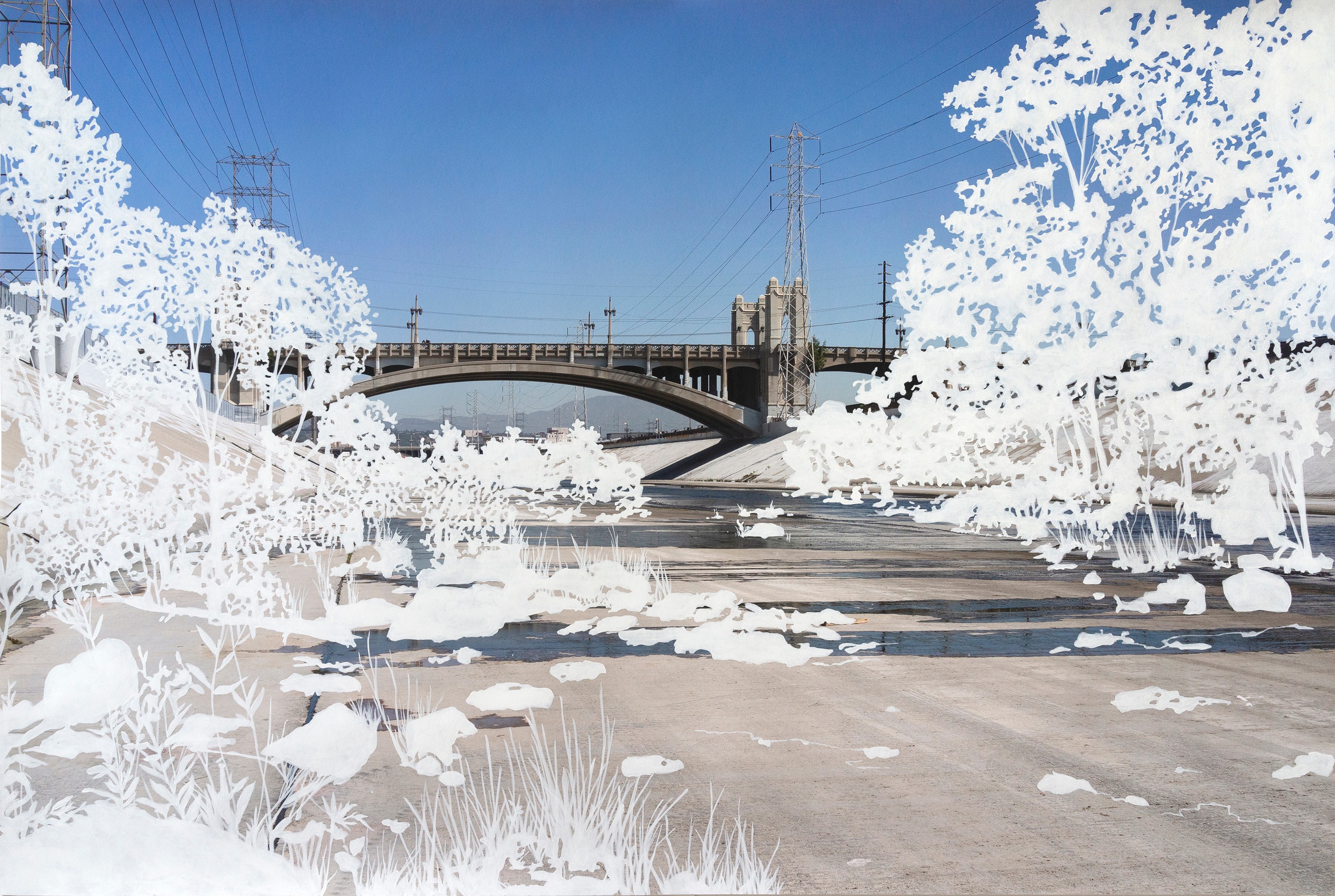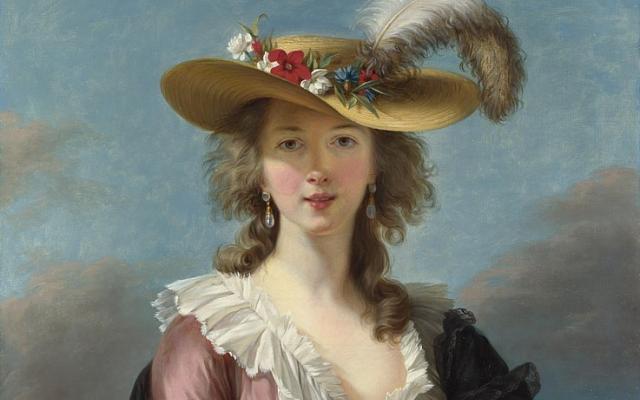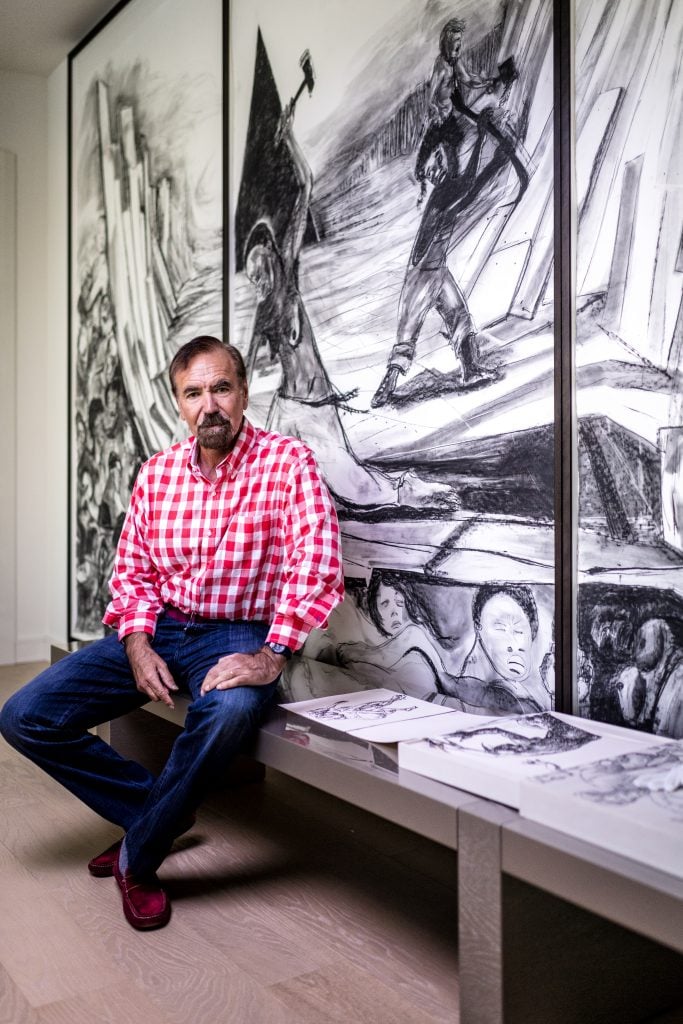In the Collage II (Marie)
2013 - Photography (Photography)
Collier Schorr
In the Collage II (Marie) (2013), Shorr seems to have an ostensibly clear subject, a female subject identified in the work’s title as “Marie,” a slim but athletic woman with brown hair pictured reclining atop a brilliantly white sheet draped against a marbled tan-and-white backdrop. Although photographed topless, Marie is depicted in slightly contorted poses that emphasize the curves of her figure while also obstructing the viewer’s gaze. Printed on high gloss paper, Marie’s portrait has the polished veneer of magazine spread, and the two portraits on display offer different vantages of the same subject. But Schorr subverts expectations: instead of framing the images flat, Schorr loosely rolls the two prints, displaying them in a clear vitrine mounted on top of a white rectangular pedestal. The display raises questions about modes of spectatorship that objectify female bodies. At the same time, Schorr activates a physicality through these portraits that belies the conventional flatness of photography. By encouraging her audience to examine her vitrine from all sides, Schorr engagers her viewer in a more complex and multi-faced mode of viewership and, by extension, allows her portraits to be seen with a kind of dimensionality closer to real life.
Collier Schorr photographs communities of people, from high school wresters in her native New York to teenagers in the German countryside clad in American military uniforms. Her work displays an almost anthropological curiosity, and in documenting her subjects, she tries to find the idiosyncratic details through which people organize into “tribal” relationships with one another. Her images, by extension, blend photographic realism with elements of fiction and fantasy as a means of representing the various ways these tribes identify themselves. Schoor’s work also investigates gender and the ways in which subjects use visual cues and embodied signs to both inhabit and subvert assumed gender expectations.
Colors:
Related works featuring themes of: » United States, » American
» see more

© » KADIST
Jason Meadows
2009The Striation Scrap Lamps (vertical and horizontal) although functioning as utilitarian objects also represent Jason Meadows’s interest in a certain kind of crafted sculpture...

© » KADIST
Kristen Morgin
2008Donald of Doom Tank (2008) is a replica of a vintage metal toy with Donald Duck’s image one side and a soldier on the other...

© » KADIST
Yin-Ju Chen
2011This work includes sketches for Extrastellar Evaluations , the project she produced at Kadist...

© » KADIST
William E. Jones
2011In Restaurant, Canton, Ohio (2011), a convenience store offers food, liquor, and Coca Cola to an empty street...
Other related works, blended automatically
» see more

© » KADIST
Collier Schorr
1999Collier Schorr’s prints upend conventions of portrait photography by challenging what it means to “document” a subject...

© » KADIST
Jason Meadows
2009The Striation Scrap Lamps (vertical and horizontal) although functioning as utilitarian objects also represent Jason Meadows’s interest in a certain kind of crafted sculpture...

© » KADIST
Kristen Morgin
2008Donald of Doom Tank (2008) is a replica of a vintage metal toy with Donald Duck’s image one side and a soldier on the other...

© » KADIST
Yin-Ju Chen
2016Through a semi-fictional approach, Extrastellar Evaluations envisions a version of history in which alien inhabitants, the Lemurians, lived among humans under the guise of various renowned conceptual and minimal artists in the 1960s (Carl Andre, Mel Bochner, and James Turrell to name a few)...
Related works sharing similar palette
» see more

© » ART AND CAKE
In the Trenches: Artists Encounter the Los Angeles River, Part 1 – Art and Cake August 30, 2023 August 30, 2023 Author In the Trenches: Artists Encounter the Los Angeles River, Part 1 Michelle Robinson 2023 What Was 4th Street Acylic paint on print 40×60 in By Lawrence Gipe In the mid-1980’s, I lived on Santa Fe Avenue and 7th Street, and the idea of Los Angeles having a “river” was a bit of a joke...

© » KADIST
Naoya Hatakeyama
Naoya Hatakeyama’s series Rikuzentakata (2011) documents the devastating aftermath of the 2011 Tohoku earthquake and tsunami in Japan...

© » KADIST
An ever-growing collection of scripts, ideas and works by: Julieta Aranda, Olivier Babin, Francisco Camacho, Derick Carner, Asli Cavusoglu, Etienne Chambaud, Audrey Cottin, Torreya Cummings, Gintaras Didziapetris, Cerith Wyn Evans, Michael Fliri, Mark Geffriaud, Fabien Giraud & Raphaël Siboni, Loris Gréaud, Graham Gussin, Will Holder, Pierre Huyghe, Joachim Koester, Gabriel Lester, Jennifer Di Marco, Patrizio Di Massimo, Nicholas Matranga & Francesca Bennet, Piero Passacantando, Cesare Pietroiusti, Matthew Shannon, Snowden Snowden, Gareth Spor, Maryelizabeth Yarbrough, Carey Young...
Other works by: » Collier Schorr
» see more

© » KADIST
Collier Schorr
1999Collier Schorr’s prints upend conventions of portrait photography by challenging what it means to “document” a subject...
Related artist(s) to: Collier Schorr » Catherine Opie, » Jens Hoffmann, » Larry Clark, » Glenn Ligon, » Hank Willis Thomas, » Hiroshi Sugimoto, » Walead Beshty, » Abraham Cruzvillegas, » Adriana Varejão, » Adriano Pedrosa
» see more

© » KADIST
Walead Beshty
2012Constructed out of metal or glass to mirror the size of FedEx shipping boxes, and to fit securely inside, Walead Beshty’s FedEx works are then shipped, accruing cracks, chips, scrapes, and bruises along the way to their destination...

© » KADIST
Hank Willis Thomas
2014Shot in black and white and printed on a glittery carborundum surface, Black Hands, White Cotton both confronts and abstracts the subject of its title...

© » KADIST
Catherine Opie
1993Like many of Opie’s works, Mike and Sky presents female masculinity to defy a binary understanding of gender...
Related works found in the same semantic group
» see more

© » LENS CULTURE
Why I Make Art - Photographs by Mari Katayama | Essay by Marigold Warner | LensCulture Feature Why I Make Art Mari Katayama reflects on the roots of her intricately staged self-portraits, in which she uses her own body—often surrounded by objects and environments she has created herself—as a lens through which to reflect society...

© » KADIST
Mary Reid Kelley
2015Kelley’s 2015 portrait of the poet Charles Baudelaire is one of a series of poets, rappers, and other thinkers who have influenced the artist’s ideas about beauty, creativity, and expression...

© » ART & OBJECT
10 Undersung Women Artists Across 500 Years | Art & Object Skip to main content Subscribe to our free e-letter! Webform Your Email Address Role Art Collector/Enthusiast Artist Art World Professional Academic Country USA Afghanistan Albania Algeria American Samoa Andorra Angola Anguilla Antarctica Antigua & Barbuda Argentina Armenia Aruba Ascension Island Australia Austria Azerbaijan Bahamas Bahrain Bangladesh Barbados Belarus Belgium Belize Benin Bermuda Bhutan Bolivia Bosnia & Herzegovina Botswana Bouvet Island Brazil British Indian Ocean Territory British Virgin Islands Brunei Bulgaria Burkina Faso Burundi Cambodia Cameroon Canada Canary Islands Cape Verde Caribbean Netherlands Cayman Islands Central African Republic Ceuta & Melilla Chad Chile China Christmas Island Clipperton Island Cocos (Keeling) Islands Colombia Comoros Congo - Brazzaville Congo - Kinshasa Cook Islands Costa Rica Croatia Cuba Curaçao Cyprus Czechia Côte d’Ivoire Denmark Diego Garcia Djibouti Dominica Dominican Republic Ecuador Egypt El Salvador Equatorial Guinea Eritrea Estonia Eswatini Ethiopia Falkland Islands Faroe Islands Fiji Finland France French Guiana French Polynesia French Southern Territories Gabon Gambia Georgia Germany Ghana Gibraltar Greece Greenland Grenada Guadeloupe Guam Guatemala Guernsey Guinea Guinea-Bissau Guyana Haiti Heard & McDonald Islands Honduras Hong Kong SAR China Hungary Iceland India Indonesia Iran Iraq Ireland Isle of Man Israel Italy Jamaica Japan Jersey Jordan Kazakhstan Kenya Kiribati Kosovo Kuwait Kyrgyzstan Laos Latvia Lebanon Lesotho Liberia Libya Liechtenstein Lithuania Luxembourg Macao SAR China Madagascar Malawi Malaysia Maldives Mali Malta Marshall Islands Martinique Mauritania Mauritius Mayotte Mexico Micronesia Moldova Monaco Mongolia Montenegro Montserrat Morocco Mozambique Myanmar (Burma) Namibia Nauru Nepal Netherlands Netherlands Antilles New Caledonia New Zealand Nicaragua Niger Nigeria Niue Norfolk Island Northern Mariana Islands North Korea North Macedonia Norway Oman Outlying Oceania Pakistan Palau Palestinian Territories Panama Papua New Guinea Paraguay Peru Philippines Pitcairn Islands Poland Portugal Puerto Rico Qatar Romania Russia Rwanda Réunion Samoa San Marino Saudi Arabia Senegal Serbia Seychelles Sierra Leone Singapore Sint Maarten Slovakia Slovenia Solomon Islands Somalia South Africa South Georgia & South Sandwich Islands South Korea South Sudan Spain Sri Lanka St...



